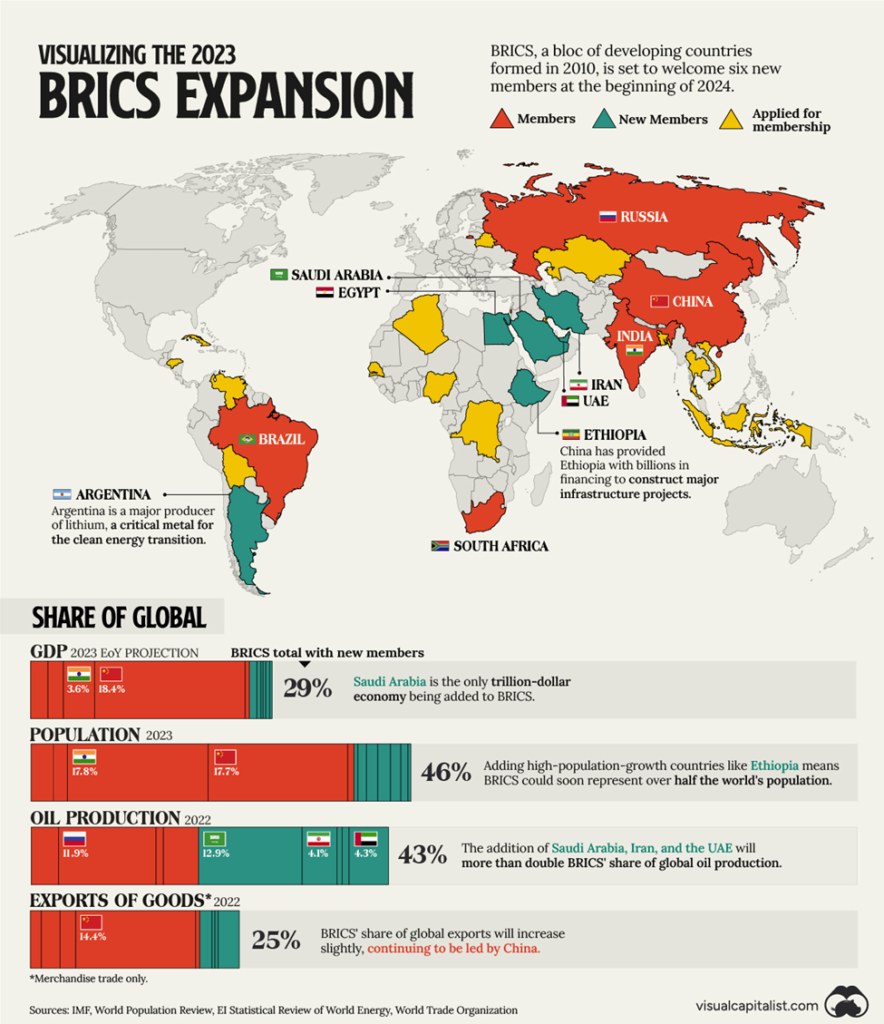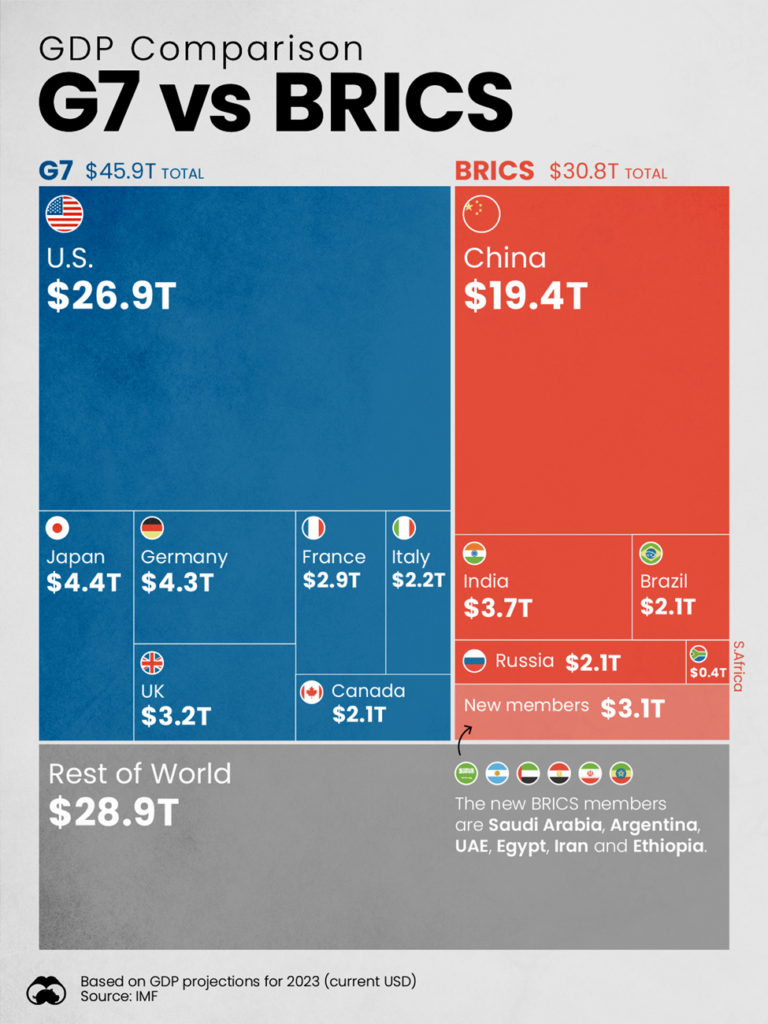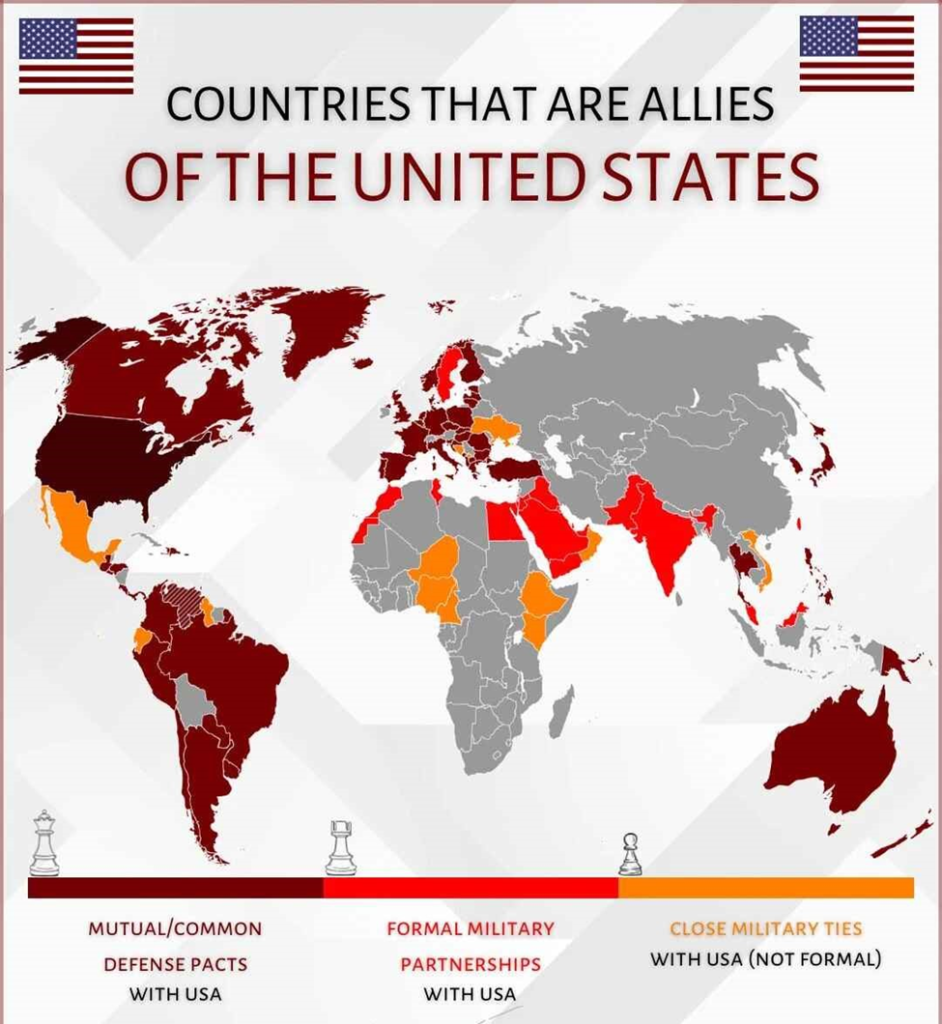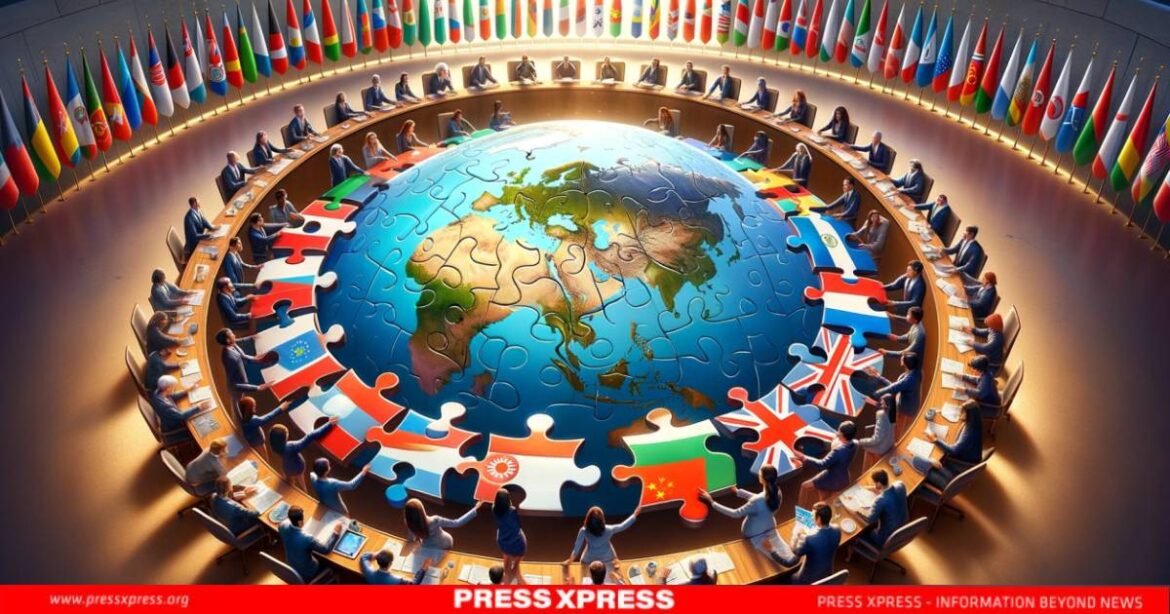The world is experiencing a significant change in its power dynamics. It’s moving away from a system dominated by a single nation towards one where multiple countries wield influence. This transition to multipolarity is reshaping global politics, economics, and security.

Key players in this new landscape include the United States, China, and the European Union. Emerging powers like India, Brazil, and Saudi Arabia are also gaining prominence. The BRICS alliance {Figure 1} in particular shows great promise in becoming one of the key players in a multipolar world, where it can challenge the US Economic hegemony {Figure 2}.
The global balance of power is in flux. As the United States’ unipolar dominance wanes, nations like China and India are ascending. This shift is creating a more distributed power structure.
You can also read: South Korea Considers Nuclear Weapons Development!
Recent conflicts, such as the Russia-Ukraine war and tensions in Gaza, illustrate the fragility of the current global order. These events also highlight the complexities of this transition period.
The rising influence of regional powers and non-state actors adds another layer of intricacy to international relations. This shift makes diplomacy more challenging and raises concerns about future global stability.
Driving Forces Behind Multipolarity
Several factors are propelling the world towards multipolarity. China’s rapid economic and military growth has significantly boosted its global influence, while India’s expanding economy is reshaping regional dynamics. The ongoing Russia-Ukraine conflict has accelerated this transition, with Russia challenging Western influence and receiving support from allies like Belarus, Iran, and China.

Economic shifts also play a crucial role. The emergence of regional economic blocs, such as BRICS, reflects the growing clout of developing economies {Figure 2}. Additionally, advancements in technology and cyber capabilities are redefining global power structures, allowing smaller nations to exert influence in new ways.
The United States Response
As the global balance of power changes, the United States is adapting its strategy to maintain its leadership position. It’s reinforcing existing alliances and forging new partnerships, particularly in regions like the Middle East and Indo-Pacific.

In the Middle East, the U.S. is balancing its relationships with traditional allies {Figure 3} while addressing regional security threats. In the Indo-Pacific, it’s strengthening ties with Japan, South Korea, and Australia to counter China’s growing influence.
Economically, the United States is investing heavily in technology and innovation, focusing on critical sectors like semiconductor manufacturing and implementing restrictions on technology exports to strategic competitors. These efforts aim to preserve America’s economic and technological edge in an increasingly competitive global environment.
Advantages and Challenges of a Multipolar World
A multipolar system offers several benefits. It can foster greater international cooperation, as power is distributed among multiple nations rather than concentrated in one. This arrangement can promote economic diversity and innovation.
Emerging economies can drive growth and create new centers of wealth. From a security perspective, multipolarity might reduce the likelihood of large-scale conflicts through mutual deterrence.
However, this new world order also presents significant challenges. Increased rivalry among major powers could lead to instability and complicate global governance. Economic and political fragmentation might result in inconsistent policies and strained alliances.
Security concerns could intensify as nations build up their military capabilities, potentially sparking regional conflicts. The spread of misinformation poses another significant threat, potentially destabilizing societies and influencing global politics.
Peace or Conflict in a Multipolar World?
The question of whether a multipolar world will be more peaceful or conflict-driven remains open. While the distribution of power among several nations can create a balance that fosters cooperation and stability, it also increases the potential for competition and conflict. The lack of a dominant global enforcer complicates international governance, potentially leading to more proxy wars and regional disputes.
Diplomatic efforts face new hurdles in this complex landscape. Reaching consensus on global issues becomes more challenging with multiple power centers, potentially hindering effective responses to crises like climate change and pandemics. The key to maintaining peace in a multipolar world lies in developing robust multilateral frameworks and practicing effective diplomacy to manage these intricate dynamics.
The Role of Proxies and Client States
In the multipolar world, proxies and client states play increasingly important roles. Major powers will use these relationships to extend their influence without direct confrontation, allowing them to pursue strategic goals while minimizing risks and costs. This approach enables powerful nations to maintain plausible deniability in conflicts, reducing direct blame for their actions.
Proxy wars have become more prevalent, with multiple global powers supporting different factions in local conflicts. These indirect engagements can destabilize entire regions and lead to humanitarian crises. The advancement of technology has intensified proxy warfare, with cyberattacks, drones, and sophisticated weaponry becoming common tools in these conflicts.
Possible Future Scenarios
Looking ahead, several scenarios could unfold in a multipolar world. One possibility is increased stability through shared interests, with countries collaborating on global challenges like climate change and cybersecurity.
Alternatively, heightened competition could lead to more regional conflicts and proxy wars. A new form of Cold War might emerge, with major powers leading opposing blocs and engaging in intense geopolitical and economic competition.
Economic decoupling is another potential outcome, with nations reducing dependencies on rival powers and forming regional economic blocs. This could fragment global trade networks and impact economic growth. The rise of middle powers like India, Brazil, and Turkey could bring more balanced and diverse international relations, potentially mediating conflicts and influencing global policies.
Conclusion
The transition to a multipolar world presents both opportunities and challenges for global stability. While it may prevent dominance by a single nation and promote cooperation, it also increases the risk of conflicts and complicates global governance.
The future will be shaped by nations’ ability to collaborate on pressing issues like climate change, cybersecurity, and global health. Strong diplomacy and effective multilateral frameworks will be crucial in navigating the complexities of this new global order and ensuring a stable, prosperous future for all.


